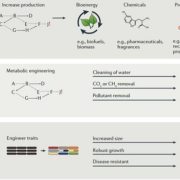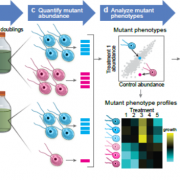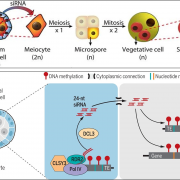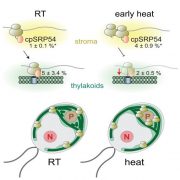Review: Engineered male sterility by early anther ablation (Frontiers Plant Sci)
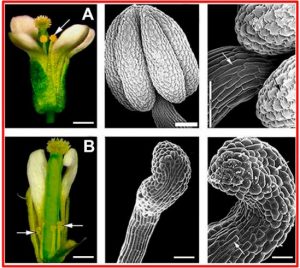 Male sterility in seed production could be used to increase crop yields, eliminate pollen allergies or avoid gene flow between genetically modified plants and other species. Here, Roque et al. developed a system to produce engineered nuclear male sterile plants using the pea Pisum sativum ENDOTHECIUM 1 (PsEND1) promoter. Immunolocalization, Northern blot and RNA in situ hybridization analyses identified and localized PsEND1 expression in pea anthers at very early stages. In transformed dicot and monocot plants (Arabidopsis, tobacco, oilseed rape, tomato, rice and wheat), the PsEND1 promoter fused with uidA reporter gene showed anther- expression. A chimeric construct was generated by joining the PsEND1 promoter, the ribonuclease barnase gene and, its inhibitor, the barstar gene. The PsEND1::barnase-barstar construct directed the expression of the barnase to anther tissues, producing genetic cell ablation and providing efficient male sterility in all the plants tested. The anther development was arrested at early stages and no pollen sacs were formed. Additional effects in the male sterile plants were observed such as increased plant longevity, branching, and number of flower and production of parthenocarpic fruits with increased yield and quality. (Summary by Ana Valladares). Front. Plant Sci. 10.3389/fpls.2019.00819
Male sterility in seed production could be used to increase crop yields, eliminate pollen allergies or avoid gene flow between genetically modified plants and other species. Here, Roque et al. developed a system to produce engineered nuclear male sterile plants using the pea Pisum sativum ENDOTHECIUM 1 (PsEND1) promoter. Immunolocalization, Northern blot and RNA in situ hybridization analyses identified and localized PsEND1 expression in pea anthers at very early stages. In transformed dicot and monocot plants (Arabidopsis, tobacco, oilseed rape, tomato, rice and wheat), the PsEND1 promoter fused with uidA reporter gene showed anther- expression. A chimeric construct was generated by joining the PsEND1 promoter, the ribonuclease barnase gene and, its inhibitor, the barstar gene. The PsEND1::barnase-barstar construct directed the expression of the barnase to anther tissues, producing genetic cell ablation and providing efficient male sterility in all the plants tested. The anther development was arrested at early stages and no pollen sacs were formed. Additional effects in the male sterile plants were observed such as increased plant longevity, branching, and number of flower and production of parthenocarpic fruits with increased yield and quality. (Summary by Ana Valladares). Front. Plant Sci. 10.3389/fpls.2019.00819


